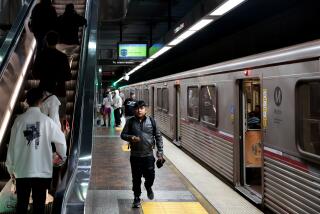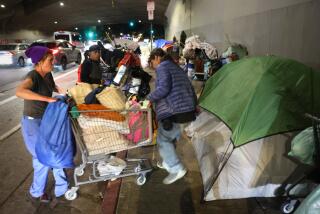MTA Hires Outside Firm to Probe Use of Wood Braces in Subway Tunnels
The Metropolitan Transportation Authority is hiring an outside consulting firm to investigate why and how project engineers allowed a contractor to use wood instead of steel bracing for subway tunnels beneath Hollywood Boulevard, officials said Friday.
The hiring of the firm was announced by MTA Chief Executive Officer Franklin E. White, who said he would seek remuneration for all costs associated with the probe from any contractors found to be responsible.
“My intention is to get for taxpayers what they paid for,” White said in an interview.
The failure of the wood wedges has been cited by project engineers as part of the reason for ground sinkages in Hollywood of up to nine inches. Tunneling has been shut down since Aug. 18, while local and federal investigators review the construction methods and engineering decisions involved.
White has said the excavation in Hollywood--part of the largest-ever subway contract in Los Angeles--will not resume until experts are satisfied that it is safe to do so. The joint venture of Shea-Kiewit-Kenny two years ago won the contract to construct 12 miles of twin tunnels connecting Wilshire Boulevard with Hollywood Boulevard with a bid of $165 million.
MTA officials said Friday that the consulting firm being hired--Wiss, Janney, Elstner Associates--is expected to complete its review within three weeks. The Chicago-area company also assisted with a review launched by White last year of subway tunnels built Downtown with concrete thinner than specified. Wiss, Janney is continuing to monitor repairs to those tunnels, which are being performed by the original construction contractor at no cost to taxpayers.
As for the new review, White said it will focus on Metro Rail engineers’ decision two years ago to approve use of the wood bracing and the recent supervision of the construction.
White also said Wiss, Janney will oversee tests of concrete poured alongside the wood bracing. Early tests have found that the concrete was of less strength than required by the contract. Additionally, White said, the new testing will verify the nature of what he called “foreign matter” apparently contained in the expansion gaps in the outer tunnel shell along with the wood and concrete.
Project engineers’ approval of the tunnel builder’s use of the 32-inch-long wood wedges, instead of metal struts, was reported Tuesday by The Times. Outside engineering experts told the newspaper that the wood as specified for the bracing was inadequate to bear the expected soil loads. The MTA later reported that recent “preliminary” strength tests of the wood used in the construction found it to be weaker than engineers had assumed when they approved its use.
Although the wood wedges are less expensive than the metal struts, transit agency engineers declined to seek any credit from the tunnel builder, Shea-Kiewit-Kenny. Shea representatives have declined comment on any aspect of the construction, citing terms of their contract.
Supervision of the construction has been handled by the MTA’s management firm, Parsons-Dillingham. White already has voiced waning confidence in that firm and the project’s design engineers, led by Parsons Brinckerhoff of New York. Both firms were responsible for reviewing and approving the substitution of the wood wedges.
Nick Patsaouras, an appointee to the MTA board, said White needs to go further than commissioning another outside review. Noting that specialists who studied the thin tunnel walls Downtown concluded in March that Parsons-Dillingham fell short of “acceptable industry practice” in its inspections, Patsaouras said major changes are needed.
“This substitution (of wood wedges for metal struts) is absolutely outrageous,” said Patsaouras, who is an engineer. “I feel at this point that White has to get past the independent panel syndrome and replace some people to regain the confidence of the taxpaying public.”
Representatives of Parsons-Dillingham, based in Pasadena, said Friday that the firm “looks forward to an independent investigation.”
More to Read
Sign up for Essential California
The most important California stories and recommendations in your inbox every morning.
You may occasionally receive promotional content from the Los Angeles Times.











